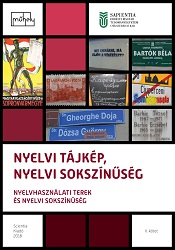Negatív transzfer a present perfect elsajátításánál a magyar –román kétnyelvű diákok esetében
Negative Transfer in the Acquisition of the Present Perfect by Hungarian-Romanian Bilinguals
Author(s): Tünde Nagy
Subject(s): Language and Literature Studies
Published by: Scientia Kiadó
Keywords: Hungarian-Romanian Bilinguals; present perfect
Summary/Abstract: The paper presents the difficulties encountered by Hungarian-Romanian bilinguals while studying the uses of the present perfect and also tries to come up with a methodology that is suitable for teaching them this tense-aspectual form. Taking into consideration the fact that one and the same verb form can have different aspectual values in Hungarian (perfect, perfective, and imperfective) depending on segmental and super-segmental features (like the use of proverbs, the presence of definite or indefinite article, and also other factors such as word order, focus, and stress), and in Romanian perfectul compus can have both narrative and perfect values, Hungarian-Romanian bilinguals are faced with a negative linguistic transfer. After briefly presenting the characteristics of the English, Hungarian, and Romanian aspectual systems, the paper presents the results of a questionnaire regarding the uses of the present perfect, filled out by students of Sapientia University, Miercurea Ciuc. The paper reinforces the idea that when teaching the present prefect it is important to consider not only linguistic aspects but non-linguistic elements as well such as motivation.
Book: Nyelvi tájkép, nyelvi sokszínűség II. Nyelvhasználati terek és nyelvi sokszínűség
- Page Range: 215-226
- Page Count: 12
- Publication Year: 2018
- Language: Hungarian
- Content File-PDF

